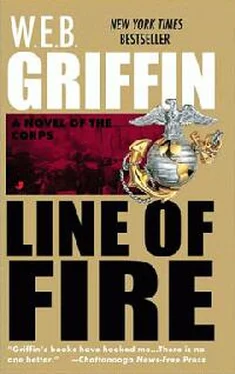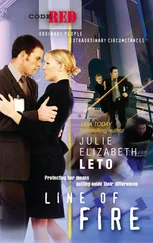W.E.B. Griffin - The Corps V - Line of Fire
Здесь есть возможность читать онлайн «W.E.B. Griffin - The Corps V - Line of Fire» весь текст электронной книги совершенно бесплатно (целиком полную версию без сокращений). В некоторых случаях можно слушать аудио, скачать через торрент в формате fb2 и присутствует краткое содержание. Жанр: prose_military, на английском языке. Описание произведения, (предисловие) а так же отзывы посетителей доступны на портале библиотеки ЛибКат.
- Название:The Corps V - Line of Fire
- Автор:
- Жанр:
- Год:неизвестен
- ISBN:нет данных
- Рейтинг книги:4 / 5. Голосов: 1
-
Избранное:Добавить в избранное
- Отзывы:
-
Ваша оценка:
- 80
- 1
- 2
- 3
- 4
- 5
The Corps V - Line of Fire: краткое содержание, описание и аннотация
Предлагаем к чтению аннотацию, описание, краткое содержание или предисловие (зависит от того, что написал сам автор книги «The Corps V - Line of Fire»). Если вы не нашли необходимую информацию о книге — напишите в комментариях, мы постараемся отыскать её.
The Corps V - Line of Fire — читать онлайн бесплатно полную книгу (весь текст) целиком
Ниже представлен текст книги, разбитый по страницам. Система сохранения места последней прочитанной страницы, позволяет с удобством читать онлайн бесплатно книгу «The Corps V - Line of Fire», без необходимости каждый раз заново искать на чём Вы остановились. Поставьте закладку, и сможете в любой момент перейти на страницу, на которой закончили чтение.
Интервал:
Закладка:
He already had a citation, so they bent a few civil service rules and made him a detective and kept him in Vice.
He was a detective three weeks when he tried to arrest an unimpressive-looking guy he caught in the act of selling a bag of marijuana leaves. Confident of both his professional skill and his unusual strength, he attempted to make the felony arrest without calling for assistance from other police officers.
Not only did the marijuana vendor successfully resist arrest, he sent Detective Hart to Sacred Heart Hospital with a broken nose, several broken ribs, and three broken fingers on his right hand. When he was subsequently apprehended, it was learned that he had been taught the fine points of street fighting in Tijuana, Mexico, where he was ultimately deported.
After Hart's broken appendages and ribs were healed, Sergeant Raphael Ramirez gave Detective Hart off-duty instruction in the manly art of self-defense as practiced in the Mexican-American neighborhoods of El Paso, Texas, where Sergeant Ramirez lived before moving to Saint Louis and joining the cops.
Detective Hart proved to be an apt pupil. He was never again injured in the line of duty.
Then the goddamn war came along.
Near the courthouse there was a bar, Mooney's, where most of the patrons were either cops or otherwise connected with the law enforcement community. Civilians (unless they were ,lounge, female, and attractive) quickly sensed they were not welcome. The other exception was members of the Armed-forces, possibly because they are by definition not civilians.
The Army, Navy, and Marine Corps recruiting offices were in the courthouse, and the enlisted personnel of these offices fell quite at home in Mooney's. Over a period of time, Detective Hart struck up an acquaintance with Staff Sergeant Howard H. Wertz, USMC, one of the Marine recruiters.
They were of an age, shared a Teutonic background, and even looked very much alike. When they were together, Detective Hart talked to Sergeant Wertz about the cops, and Sergeant Wertz talked to Detective Hart about The Marine Corps.
Now and again the question of Detective Hart's possible military service came up. Though it had been decided early on that police work was an essential service and its practitioners exempt from the draft, in Sergeant Wertz's judgment the draft deferment for police officers would not last long. Soon they too would be summoned by their friends and neighbors to military service.
After a while Sergeant Wertz suggested to Detective Hart that he might not have to worry anyhow, since he might not pass the physical examination. Whether Hart was fit for service or not, Sergeant Wertz suggested, would be a good thing to know. A few days after that, he told Detective Hart he had a buddy at the Armed Forces Induction Center who would run Detective Hart through the examination process "off the books," as a special favor.
The results of the physical were a mixed blessing. Detective Hart was in really splendid physical condition, which was nice to know. At the same time they were a little unnerving, for if Sergeant Wertz was correct and the police deferment was eliminated, Hart would go into the Armed Forces.
Perhaps it might be a good idea, Sergeant Wertz suggested, to start looking around to see what Detective Hart could get from the services in exchange for his immediate enlistment, rather than waiting for his Draft Board to send him the Your Friends and Neighbors Have Selected You postcard.
Two days after that, Sergeant Wertz told his friend Detective Hart the good news: The Marine Corps just happened to be looking for a few good men with police backgrounds who would be utilized in law enforcement areas. The only problem was that "The Program" (as Sergeant Wertz called it) was nearly full and about to close. So Hart would have to make up his mind quickly.
When Detective Hart consulted him, his father was enthusiastic: "If you have to go, George, and it looks like you'll have to, that's the way to do it. Otherwise they'll hand you a rifle and turn you into cannon fodder." Private Hart was in The Marine Corps three days when he learned from a personnel clerk at Parris Island that the Marines not only did not have a law enforcement recruitment program, they'd never had one. In other words, he was like anyone else who had enlisted in The Corps: He'd be assigned where The Corps decided he would be of the greatest value. In his case it was The Marine Corps' intention to hand him a rifle, teach him how to use it, and assign him to la rifle company as a rifleman-a/k/a cannon fodder.
One of the reasons Private Hart looked forward to graduation from Parris Island was that afterward he would be given a short leave. During that time he planned to return to Saint Louis, locate Staff Sergeant Wertz, and break both of the sonofabitch's arms.
But Staff Sergeant Wertz was not the only Marine noncom who, in his view, deserved such treatment.
Private George F. Hart, USMCR, was in the fifth week of his recruit training when he decided to render as-painful-as-possible bodily harm to Corporal Clayton C. Warren, USMC. He did not actually intend to kill Corporal Warren, who was one of the assistant drill instructors of his platoon, but the thought of breaking Corporal Warren's arm was, well, satisfying.
Though every man in the platoon had the same wish, Private Hart believed he was the only one with the necessary expertise to do it and get away with it. He wished to do so for two reasons. One was personal, and the other was For the Good of the Service (at least as he saw it).
And today was the day.
The first time Private Hart saw Corporal Clayton C. Warren at Parris Island, he thought the guy was one of the hillbilly pimps he had made in Saint Louis. Warren bore an astonishing physical resemblance-tall, bony, sharp-featured, no chin, and a large, fluid Adam's apple-to a shitkicker from Arkansas or someplace like that who had prostituted his fifteen-year-old wife rather than get a goddamn job.
And when Corporal Warren first opened his mouth, thus proving he was indeed a hillbilly shitkicker, the likeness was even more astonishing. Hart had to remind himself that his shitkicking hillbilly was doing three-to-five; it couldn't possibly be the same man.
Hart understood the necessity and value of the rigorous recruit training program of The Marine Corps. In his judgment, it had three aims: First was to bring the recruits up to a standard of physical strength and endurance which would permit them to fight the enemy; many of them had never lifted anything much heavier than a schoolbook. Second, it was intended to give them the necessary military skills, from the obvious (how to accurately fire and care for a rifle) to the less obvious (how to live in the field on nothing but what you carried on your back). Many of Hart's fellow recruits had never held a firearm until they came to Parris Island; and they'd never slept anywhere but on a soft bed.
Third, and most important, was to teach a bunch of civilians discipline: that is, to do whatever they were told to do, to the best of their ability, whenever they were told to do it. This was surely the most difficult training task the drill instructors and their assistants faced, and Hart was well aware that not many students were going to like the curriculum.
All of this having been said, it was Hart's judgment that The Marine Corps had made a mistake (despite the Parris Island Holy Writ that this kind of mistake was not possible). They had placed at least part of the responsibility of turning civilians into Marines into the hands of a semiliterate, sadistic, hillbilly shitkicker who got his rocks off by humiliating and physically abusing anyone he suspected of having more brains than he did. That meant all but one or two of the men in the platoon.
Corporal Clayton C. Warren, USMC, was not only a really vicious prick, but a dangerous one. On three occasions, for instance, Hart saw him actually trip men running up an inclined log on the obstacle course. One of the men broke his arm; it was only luck that the other two suffered only minor sprains and abrasions.
Читать дальшеИнтервал:
Закладка:
Похожие книги на «The Corps V - Line of Fire»
Представляем Вашему вниманию похожие книги на «The Corps V - Line of Fire» списком для выбора. Мы отобрали схожую по названию и смыслу литературу в надежде предоставить читателям больше вариантов отыскать новые, интересные, ещё непрочитанные произведения.
Обсуждение, отзывы о книге «The Corps V - Line of Fire» и просто собственные мнения читателей. Оставьте ваши комментарии, напишите, что Вы думаете о произведении, его смысле или главных героях. Укажите что конкретно понравилось, а что нет, и почему Вы так считаете.









